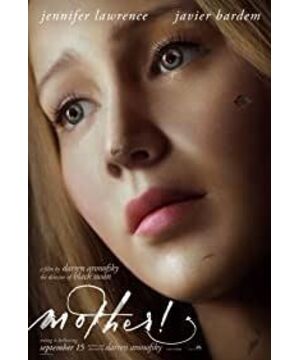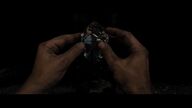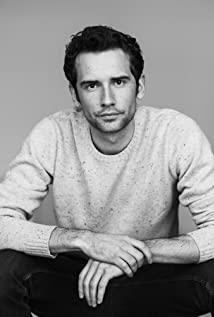This annual topic of the year, which burst out reviews as soon as it was released, was heated and debated around the scandal of Darren Aronofsky and the heroine's cousin Jennifer Lawrence.
During the filming, the two were full of affection on the set, but after the filming ended, the two announced their breakup. During the filming, there were rumors that Jennifer Lawrence was impressed by his talent at first, and then he couldn't stand Darren's crazy behavior. And ideas.
Darren Aronowski is well-known for his talent and madness in Hollywood film circles.
His first independent film "Pi" attracted the attention of fans and filmmakers all over the world.
His second work is "Requiem of Dreams", which countless fans said, "It seems like you have died once after watching it"!
After the shooting of the third work "The Source of True Love", he married Rachel Weisz, the heroine in the film, and had children, but the two came to an end in four years.
His fourth work "Wrestling King" won the Venice Golden Lion Award.
Two years later, "Black Swan" won the Golden Globe Award for Best Picture, nominated for the Oscar for Best Picture, and helped Natalie Portman win the Oscar queen.
The output is not high, but the parts are exquisite, which shows Darren's talents.
Fans who have watched "Requiem for Dreams" and "Black Swan" must be familiar with his movie style and character settings.
Inserting crazy illusions into the gradual collapse of reality, and then blurring reality and imagination, fiction and reality, making nightmares come true, and constantly forcing characters to abandon the stable present and go to the future where only spirit can exist.
A mother who lost her self under the encroachment of drugs; a
self-destructive dancer driven by desire;
a wrestler who continues to destroy his body for glory and seeks to achieve spiritual survival;
the characters in Darren's films are always extreme, preferring to sacrifice the body and pursue the ultimate Mental "abnormal person".
They chose nothingness instead of sticking to existence. They crave unlimited freedom and fear the finite cage.
This time, Darren Aronowski completely released himself in "Mother". In a film that was less than two hours long, he incorporated various thematic elements such as religion, politics, and gender relations. The use of countless metaphors and symbols has brought a huge amount of information blank, giving the film a huge space for multiple interpretations.
The full screen of sexual cues, the torn marriage agonies, and the reproductive anxiety that appear every second, make movie fans feel uneasy and uncomfortable at all times.
With "Mother" as the title, women are undoubtedly the narrative and thematic focus of the film.
In the early promotional posters, "Mother" has a high tribute to the Roman Polanski film "Rosemary's Baby" in 1968 Isomorphic works.
The film also wraps the topic of women in religious clothing. It is a contemporary "Idennfilm" (Idennfilm) with a clear depiction of social phenomena based on the social context of the year.
Both films use pregnancy, pregnancy, childbirth, and post-pregnancy as the narrative nodes, and they drew on many topics related to women from the structure and theme.
The film "Mother" tells such an incredible story.
Men and women live in an isolated house. The man is a poet who is suffering from the powerlessness of his pen, and the woman comforts him, and decorates the house alone.
One day, the strange man man broke the peace between the two.
This middle-aged man who is always coughing and not much time is an admirer of the poet.
Mother felt that her private space was disrupted for the first time.
The chaos is still growing.
The next day, man's wife woman came to the house.
The woman kept mentioning the scars on the bottom of Mother's heart without a child, and reminded her that she needed to add some "color" to herself to regain the passion of life for both sexes.
Desire and jealousy flared up in Mother's heart, and she and the house fell into a "toddling" anxiety.
The pressure continues to escalate.
The two sons of man and woman came to the house one after another. Due to inheritance issues, the two fought, one of them killed the other.
Paradoxically, the funeral was actually held in Mother's house. More strangers came to this house, and chaos ensued.
Sexual chaos, unreasonable demands, and the high squeeze of private space continued to play out in the house, until someone sat on the sink at home, and the flood finally angered Mother, who angrily drove everyone away.
That night, Mother transferred her anger to her husband, and the two of them quarreled overnight.
The next day, the sun was shining, and Mother happily said that she was pregnant. The man had the inspiration of poetry, and all the unsuitability and anxiety disappeared instantly.
The film went from an anxious "pregnancy" to a seemingly stable pregnancy.
The magic of the film is the "production phase" of the last 30 minutes.
Mother prepared the "Last Supper" for the sale of the poet's works, but the crazy admirers kept entering the house and it was upset.
The film immediately entered the most magical moment, and WTF's shock and sighs were as continuous as the surging river.
In the throes of Mother's labor, the people in the whole house gradually went crazy.
Religious worship, bloody beheadings, fierce wars, imprisoning women, beating, smashing, looting, and other real chaos tore the house apart.
The dazzling metaphorical scenes are staged in a burst of lightning.
Dream and reality overlap once again.
This amazing scene also caused great controversy because of the high concentration of symbolic expression. Some people praised the performance of genius, while others criticized it for being chaotic and too ambitious.
The mundane production scene of the gods ends with the birth of a baby boy.
But WTF's excitement is still to come.
The husband snatched Mother's baby boy, and the fans who fell into the devil downstairs actually ate the holy baby.
Finally, Mother picked up the lighter left by the man at the beginning and burned the entire house.
Everything went to nothing, Mother was bruised and bruised, only her husband was safe and sound.
The woman cried and said, "I gave everything," and the
man said, "No, it's not your sincerity"!
As a result, the man escaped from the woman's heart, and the bloody heart gradually turned into a diamond for a moment, and was placed on a stent by the man as a permanent display.
At the end of the film, another Mother gets up from the bed;
and at the beginning of the film, the man happily put a diamond heart on the bracket.
In this way, the film echoes back and forth in a circular structure, falling into reincarnation.
Women’s tragedies seem to never end. The houses they have worked so hard on will eventually disappear, and men will eventually take out their hearts as the most beautiful and conspicuous symbol of patriarchy.
The story on the surface of "Mother" is undoubtedly the see-saw about the relationship between the sexes in family and love.
Mother who is willing to be a housewife always depends on her and cannot leave her husband. Whenever a crisis comes, her husband is always absent or makes decisions blindly and arbitrarily.
The husband kept comforting, but in fact only wanted to achieve his own goals.
In the story, when an unfamiliar couple intervenes, it is a metaphor for the physical and mental control of the people around Mother. This is the individual intervening in Mother's private space, affecting her family and the relationship with her husband.
And the large number of fans who came immediately, this is a sign of various temptations after the husband's success in his career. Female fans and female agents who admire and adore him are all potentially huge threats.
Mother thinks that pregnancy can solve all problems, but the solution is only temporary, and the husband's heart is always outside.
Mother asked directly, "Isn't it enough to have me"?
The husband replied coldly, "I love you, but I don't want to give up everything outside."
A man traps women in his home and paints the ground as a prison, but he is afraid that his home will become his dungeon too, always thinking about the colorful world outside.
The "siege" effect is probably like this.
The film shows women's reproductive anxiety in marriage relationships, and also shows men's fear of pregnant women.
This strange and unfamiliar ability of women seems dangerous and terrifying.
So in the pregnancy stage, he didn't want to touch Mother's body at all.
During pregnancy, he immersed himself in his creation.
In the production stage, he flees outside the house, immersed in the adoration of fans, and does not want to go home.
In the post-pregnancy stage, he sat in a chair in distress, staring at the mother who was lying on the ground and holding the child like an emperor.
After Mother fell asleep in exhaustion, he immediately snatched away Mother's child, who was also his own child, and dedicated it to his crazy fans.
Everything about a woman can be shared, except for himself.
Not only that, the whole house is actually a symbol of the female body.
The heart in the wall;
the bloody crack on the floor; the
moment of passion, the rain is pouring, and the glass window in the roof is wet.
These obvious physical cues continue to appear in the film, and the whole house becomes a metaphor for the female body, a representation of some organs, and even a materialized symbol of her heart and spirit.
In 1975, the feminist hero Simon Pova attended her only television interview. She said: The
reason why women are women is not the result of natural selection, but history. In her famous "Second Sex Theory", she has fully unveiled the veil of power that has shrouded women for thousands of years from the perspectives of biology, psychoanalysis, and historical materialism.
From Rosemary to the heroine Mother in "Mother" today, it seems that nothing has changed much in the past 50 years.
Director Darren Aronofsky obviously doesn't stop there.
The blatant religious metaphor seems to have a different meaning.
The strange man who came to the house first was called the man. The wound on his waist showed that he was regarded as Adam, and the wife who appeared the next day was undoubtedly an Eve made after taking out his ribs.
The two came to the "forbidden zone" of Mother's husband and broke the heart of the gem, which is God's forbidden fruit.
Then the two fell into a vortex of eroticism, which also affected Mother.
The two young men who came to the house to fight each other are undoubtedly Cain and Abel.
The flood of water in the house is God's punishment for mankind, but Noah does not appear.
At the end of the film, Mother, who is dying after being burned, asks her husband "Who are you?" The answer is very clear.
Mother, dressed in the cloak of the Virgin Mary, gave out the Son Jesus, and the young child who was eaten by the crazy fans was obviously "Christ Devotion."
It is clear who the husband is and who he plays.
And this house, and the forest outside, are compared to the Garden of Eden given to Adam and Eve by God.
The Garden of Eden multiplied mankind, but in the end mankind destroyed everything by himself.
After the fire, it was like hell.
But after the arrival of the new Mother, God restored everything to life, and the house changed back to its former appearance. Outside the house is full of vitality.
Will Adam and Eve, their descendants, make the same mistakes and fall into endless reincarnation?
After listening to the ending song, "the end of the world", you may get the answer.
Why does my heart go on beating?
Why do these eyes of mine cry?
Don't they know it's the end of the world?
It ended when you said goodbye ......
View more about Mother! reviews











